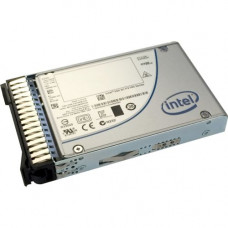Shopping Cart
0 item(s) - $0.00- Accortec, Inc.
- Addon Tech
- Advantech Co., Ltd
- Axiom
- BLACKBOX
- C2g
- Chief Manufacturing
- Cisco
- Dell
- EATON
- EMC
- Enet Components, Inc.
- Fortinet
- Getac, Inc
- HP
- HPE
- IBM
- Intel
- Legrand Group
- Lenovo
- Lexmark
- Middle Atlantic Products, Inc
- Monoprice, Inc
- National Products, Inc
- Panduit Corp
- StarTech.com
- Supermicro
- TDK
- Tripp Lite
- Veritas Technologies Llc
Lenovo P3700 400 GB Solid State Drive - PCI Express (PCI Express 3.0 x4) - 2.5" Drive - Internal - 2.80 GB/s Maximum Read Transfer Rate - 1.90 GB/s Maximum Write Transfer Rate - Hot Swappable 00YA818
Add to Compare
Non-Volatile Memory Express (NVMe) is new PCIe 3.0 high performance SSD technology that provides high I/O throughput and low latency. NVMe interfaces remove SAS/SATA bottlenecks and unleash all of the capabilities of contemporary NAND flash memory. Each NVMe PCI SSD has direct PCIe 3.0 x4 connection, which provides at least 2x more bandwidth and 2x less latency than SATA/SAS-based SSD solutions. NVMe drives are also optimized for heavy multi-threaded workloads by using internal parallelism and many other improvements, such as enlarged I/O queues. The P3700 NVMe drives have the following key characteristics: Direct PCIe 3.0 connection. There is a PCIe 3.0 x4 connection for each NVMe drive with up to 4 GBps overall throughput. Low I/O latency. The average read/write latency for the P3700 drives is 20 µs. Up to 2800 MBps sequential read speed with 128 KB blocks, and up to 2000 MBps sequential write speed with 128 KB blocks per drive. Up to 460,000 IOPS of random read with 4 KB blocks, and up to 175,000 IOPS of random writes with 4 KB blocks. A total of 65,536 I/O queues supported and 65,536 commands per queue supported, which provides great performance on heavily multithreaded workloads with combined sequential and random access. High endurance: The P3700 drives include High Endurance Technology (HET) which combines NAND silicon enhancements and SSD NAND management techniques to extend SSD write endurance up to 17 drive writes per day (DWPD) for 5 years. Available drive capacities or 400 GB, 800 GB, 1.6 TB, and 2.0 TB. Support for software RAID under operating system management. Hot add and hot remove features are available with supported operating systems. Most operating systems have native support of NVMe drives or provides support through software drivers, such as RHEL 6.5 and later, RHEL 7.0 and later, SLES 11 SP3, SLES 12, Windows Server 2008 R2, Windows Server 2012, Windows Server 2012 R2, and VMware vSphere (ESXi) 5.5 and 6.0. NVMe drives can be used as boot drives.
Technical Specifications:
Storage Capacity: 400 GBMaximum Read Transfer Rate: 2867.20 MB/sMaximum Write Transfer Rate: 1945.60 MB/sDrive Interface: PCI ExpressDrive Interface Standard: PCI Express 3.0 x4Drive Type: InternalForm Factor: 2.5"Hot Swappable: YesHeight: 0.3"Width: 2.8"Depth: 3.9"Weight (Approximate): 4.06 ozCompatibility: Lenovo Flex System x240 M5 Compute Node (9532)Environmentally Friendly: YesEnvironmental Certification: China RoHS, WEEE, RoHSDevice Supported: ServerCountry of Origin: China
Write a review
Your Name:Your Review: Note: HTML is not translated!
Rating: Bad Good
Enter the code in the box below:


